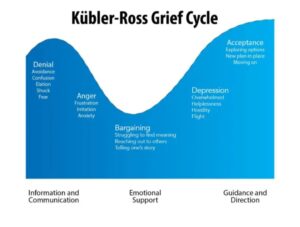Kubler Ross’s five stages of Grief.
5 stages of grief by KULBER ROSS.
Throughout life, we experience many instances of grief. Children may grieve a divorce, a wife may grieve the death of her husband, a teenager might grieve the ending of a relationship, or you might have grieved the loss of a pet.
Five stages of grief are –
• Denial
• Anger
• Bargaining
• Depression
• Acceptance
Denial
Denial is the stage that can initially help you survive the loss. You might think life makes no sense, has no meaning, and is too overwhelming. You start to deny the news and, in effect, go numb.It’s common in this stage to wonder how life will go on in this different state—you are in a state of shock because life as you once knew it has changed in an instant. If you were diagnosed with a deadly disease, you might believe the news is incorrect—a mistake must have occurred somewhere in the lab; they mixed up your blood work with someone else’s. If you receive news of the death of a loved one, perhaps you cling to a false hope that they identified the wrong person. In the denial stage, you are not living in “actual reality,” rather, you are living in a “preferable” reality.
Anger
Once you start to live in “actual” reality again, anger might start to set in. This is a common stage to think “Why me?” and “Life’s not fair!” You might look to blame others for the cause of your grief and also may redirect your anger to close friends and family. You find it incomprehensible how something like this could happen to you. If you are strong in faith, you might start to question your belief in God: Where is God? Why didn’t he protect me?
Researchers and mental health professionals agree that this anger is a necessary stage of grief. And encourage the anger. It’s important to truly feel the anger. Even though it might seem like you are in an endless cycle of anger, it will dissipate—and the more you truly feel the anger, the more quickly it will dissipate, and the more quickly you will heal. It is not healthy to suppress your feelings of anger—it is a natural response—and perhaps, arguably, a necessary one.
Bargaining
When something bad happens, have you ever found yourself making a deal with God? “Please God, if you heal my husband, I will strive to be the best wife I can ever be, and never complain again.” This is bargaining. Guilt is a common wingman of bargaining. This is when you can experience a seemingly endless string of “what ifs”: What if I had left the house 5 minutes sooner? The accident would have never happened. What if I encouraged him to go to the doctor six months ago like I first thought? The cancer could have been found sooner and he could have been saved.
Depression
Depression is commonly associated with grief. It can be a reaction to the emptiness we feel when we are living in reality and realize the person or situation is gone or over. In this stage, you might withdraw from life, feel numb, live in a fog, and not want to get out of bed. The world might seem too much and too overwhelming for you to face. You might not want to be around others or feel like talking, and you might feel hopeless. You might even experience suicidal thoughts, thinking “What’s the point of going on?”
Acceptance
The last stage of grief identified by Kübler-Ross is acceptance. Not in the sense that “it’s OK my husband died” but rather, “my husband died, but I’m going to be OK.”
In this stage, your emotions may begin to stabilize. You re-enter reality. You come to terms with the fact that the “new” reality is your partner is never coming back, or that you are going to succumb to your illness. It’s not a “good” thing, but it’s something you can move forward from.
It is definitely a time of adjustment and readjustment. There are good days, there are bad days, and then there are good days again. In this stage, it does not mean you’ll never have another bad day, where you are uncontrollably sad. But, the good days tend to outnumber the bad days.In this stage, you may lift from your fog, start to engage with friends again, and might even make new relationships as time goes on. You understand your loved one can never be replaced, but you move, grow, and evolve into your new reality.



Leave A Reply